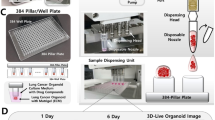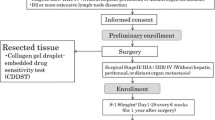Abstract
Objective
There are many predictive factors for gefitinib sensitivity, including epidermal growth factor receptor (EGFR) gene mutation, EGFR copy number, and k-ras mutation. To investigate all of them is too expensive. We evaluated the chemosensitivity for gefitinib in non-small-cell lung cancer (NSCLC) using a histoculture drug response assay (HDRA).
Methods
Surgically resected fresh tumor specimens from 22 patients with NSCLC were used. There were 13 male and 9 female patients, ranging in age from 49 to 84 (average 70) years old. Sixteen patients (73%) were smokers. Sixteen adenocarcinomas, four squamous cell carcinomas, and two other histological types were included. Small pieces of viable cancer tissue were placed on the collagen gel and then cultured for 7 days in the presence of gefitinib.
Results
The HDRA was successful in all specimens. A dose-response relation was observed between inhibition rates and gefitinib concentration (p = 0.016). The inhibition rate at 20 μg/ml (IR20) in adenocarcinoma without smoking (39.2% ± 35.1%, n = 6) was higher than that with smoking (2.2% ± 5.0%, n = 10, P = 0.001) and that of nonadenocarcinoma (16.9% ± 23.6%, n = 6, P = 0.09). Gene mutation analysis was performed in two of three adenocarcinomas without smoking, which showed especially high IR20 values, and sensitizing mutations were observed in these specimens. A cutoff inhibition rate of approximately 40%–50% appeared to be suitable for a concentration of 20 μg/ml.
Conclusion
HDRA appears to be applicable for evaluating sensitivity to gefitinib in NSCLC. It provides a convenient method for predicting the response to gefitinib in patients with NSCLC whose fresh tumor specimens are available.
Similar content being viewed by others
References
Mitsudomi T, Kosaka T, Endoh H, Horio Y, Hida T, Mori S, et al. Mutations of the epidermal growth factor receptor gene predict prolonged survival after gefitinib treatment in patients with non-small-cell lung cancer with postoperative recurrence. J Clin Oncol 2005;23:2513–2520.
Hirsch FR, Varella-Garcia M, McCoy J, West H, Xavier AC, Gumerlock P, et al. Increased epidermal growth factor receptor gene copy number detected by fluorescence in situ hybridization associates with increased sensitivity to gefitinib in patients with bronchioloalveolar carcinoma subtypes: a Southwest Oncology Group study. J Clin Oncol 2005;23:6838–6845.
Cappuzzo F, Varella-Garcia M, Shigematsu H, Domenichini I, Bartolini S, Ceresoli GL, et al. Increased HER2 gene copy number is associated with response to gefitinib therapy in epidermal growth factor receptor-positive non-small cell lung cancer patients. J Clin Oncol 2005;23:5007–5018.
Pao W, Wang TY, Riely GJ, Miller VA, Pan Q, Ladanyi M, et al. KRAS mutations and primary resistance of lung adenocarcinomas to gefitinib or erlotinib. PLoS Med 2005 2(1):e17. Epub 2005 Jan 25.
Pao W, Miller VA, Politi KA, Riely GJ, Somwar R, Zakowski MF, et al. Acquired resistance of lung adenocarcinomas to gefitinib or erlotinib is associated with a second mutation in the EGFR kinase domain. PLoS Med 20052(3):e73.
Kubota T, Sasano N, Abe O, Nakao I, Kawamura E, Saito T, et al. The potential of the histoculture drug response assay to contribute to cancer patient survival. Clin Cancer Res 1995;1:1537–1543.
Furukawa T, Kubota T, Hoffman RM. Clinical applications of the histoculture drug response assay. Clin Cancer Res 1995;1:305–311.
Ohie S, Udagawa Y, Aoki D, Nozawa S. Histoculture drug response assay to monitor chemoresponse. Methods Mol Med 2005;110:79–86.
Yoshimasu T, Oura S, Hirai I, Tamaki T, Kokawa Y, Hata K, et al. Data acquisition for the histoculture drug response assay in lung cancer. J Thorac Cardiovasc Surg 2007;133:303–308.
Akaike H. Information theory and an extension of the maximum likelihood principle. In: Petrov BN, Csaki H, editors. Second international symposium on information theory. Budapest: Akademiai Kaido; 1973. p. 267–281.
Fukuoka M, Yano S, Giaccone G, Tamura T, Nakagawa K, Douillard JY, et al. Multi-institutional randomized Phase II trial of gefitinib for previously treated patients with advanced non-small-cell lung cancer (The IDEAL 1 Trial) [corrected]. J Clin Oncol 2003;21:2237–2246.
Kaneda H, Tamura K, Kurata T, Uejima H, Nakagawa K, Fukuoka M. Retrospective analysis of the predictive factors associated with the response and survival benefit of gefitinib in patients with advanced non-small-cell lung cancer. Lung Cancer 2004;46:247–254.
Knight LA, Di Nicolantonio F, Whitehouse P, Mercer S, Sharma S, Glaysher S, et al. The in vitro effect of gefitinib (’Iressa’) alone and in combination with cytotoxic chemotherapy on human solid tumours. BMC Cancer 2004;4:83.
Nakatani K, Takao M, Nishioka J, Yasuda K, Noma K, Hayashi A, et al. Association of epidermal growth factor receptor mutations in lung cancer with chemosensitivity to gefitinib in isolated cancer cells from Japanese patients. Eur J Cancer Care (Engl) 2007;16:263–267.
Yoshimasu T, Oura S, Hirai I, Kokawa Y, Okamura Y, Furukawa T. Dose-response curve of paclitaxel measured by histoculture drug response assay. Gan To Kagaku Ryoho 2005;32:497–500.
Yoshimasu T, Oura S, Hirai I, Tamaki T, Ota F, Nakamura R, et al. Evaluation of dose-response curve of anticancer agents using surgically resected specimens. Abstract of the 4th Annual Meeting of Japanese Society of Medical Oncology, 2006, p. 331.
Yoshimasu T, Oura S, Hirai I, Tamaki T, Kokawa Y, Ota F, et al. In vitro evaluation of dose-response curve for paclitaxel in breast cancer. Breast Cancer 2007;14:401–405.
Author information
Authors and Affiliations
Corresponding author
Rights and permissions
About this article
Cite this article
Yoshimasu, T., Ohta, F., Oura, S. et al. Histoculture drug response assay for gefitinib in non-small-cell lung cancer. Gen Thorac Cardiovasc Surg 57, 138–143 (2009). https://doi.org/10.1007/s11748-008-0332-x
Received:
Accepted:
Published:
Issue Date:
DOI: https://doi.org/10.1007/s11748-008-0332-x




